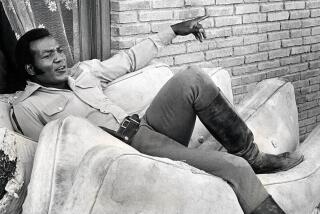Television Reviews : ‘Tenth Man’ Not Up to ‘Hall of Fame’ Standards
- Share via
If ever a TV story squandered a promising plot and fine cast, it’s “The Tenth Man.”
Graham Greene’s morality tale--which originated as a 1943 movie treatment for MGM--airs at 9 p.m. Sunday on CBS (Channels 2 and 8), a “Hallmark Hall of Fame” production of little distinction.
The year is 1941 and the setting is Occupied France, where wealthy attorney Jean-Louis Chavel (Anthony Hopkins) is jailed by the Nazis in a random taking of hostages for potential execution in reprisal for Resistance activity. The night before he is to be executed, Chavel bribes another prisoner to take his place, signing over his estate and holdings to the man, who then wills them to his mother and sister, Therese (Kristin Thomas).
Briefly, at least, the doomed prisoner is a wealthy man, spending his final hours savoring his elevated status. “I am going out in style,” he tells Chavel. “Your style.”
Now flash forward three years, when France’s liberation means freedom for the now penniless Chavel. He returns to his old house, where the working-class mother and Therese now live, bitter and hateful toward the man named Chavel whose face they’ve never seen. Keeping his identity a secret, Chavel stays on as a workman, ingratiating himself to Therese, only to face a crisis when an imposter (Derek Jacobi) shows up one night claiming to be Chavel.
Although grandly mounted at a chateau outside Paris, “The Tenth Man” is very much an interior story that weighs personal values against reality and human nature, and the real Chavel against the scheming, manipulative con man who call himself Chavel.
The plot’s morality conflicts are intriguing, with only a fine line separating cowardice from the natural instinct for survival. As executed by writer Lee Langley and director Jack Gold, however, Greene’s story is rarely convincing.
That some of the characters occasionally act implausibly is tolerable. But the holes in the script are too large to overlook.
How, for example, is the prison-cell exchange that saves Chavel’s life legally consummated on the outside so that Therese and her mother will actually acquire Chavel’s wealth? Surely his Nazi captors don’t make the arrangements for Chavel. And how is it possible that no one in the village near his estate recognizes the liberated Chavel, whose prison beard and newly acquired glasses do not substantially alter his appearance from three years earlier?
When the local priest (Cyril Cusak), whom he has apparently known for 50 years, does not recognize Chavel as they walk together, “The Tenth Man” truly plunges into the realm of unbelievability.
If “The Tenth Man” falls below the usual “Hallmark Hall of Fame” standards, the same can’t be said of “Promise,” the splendid, Emmy Award-lavished “Hallmark” production returning Dec. 13 on CBS. James Garner shines as a man who tries to fulfill a 30-year-old vow he made to his mother to care for his schizophrenic younger brother. But it’s James Woods who is absolutely glorious here as the younger man, a role for which he won an Emmy.
In contrast to “The Tenth Man,” that 1986 production is captivating, deeply moving, memorable television. That’s a promise.
More to Read
The complete guide to home viewing
Get Screen Gab for everything about the TV shows and streaming movies everyone’s talking about.
You may occasionally receive promotional content from the Los Angeles Times.






